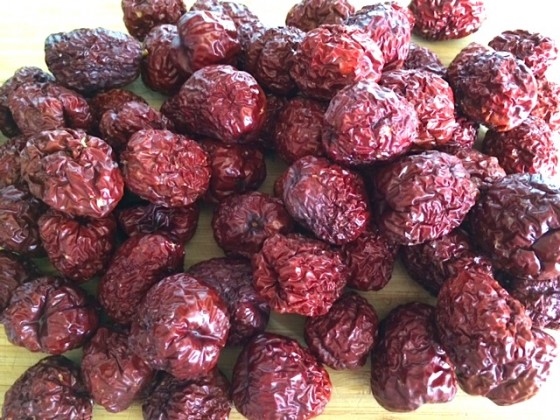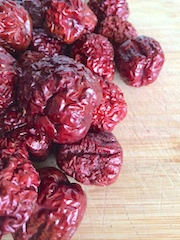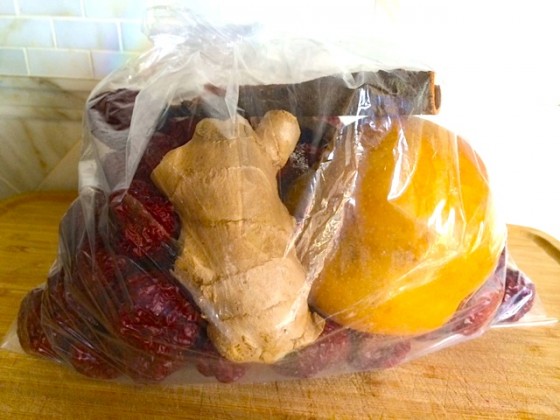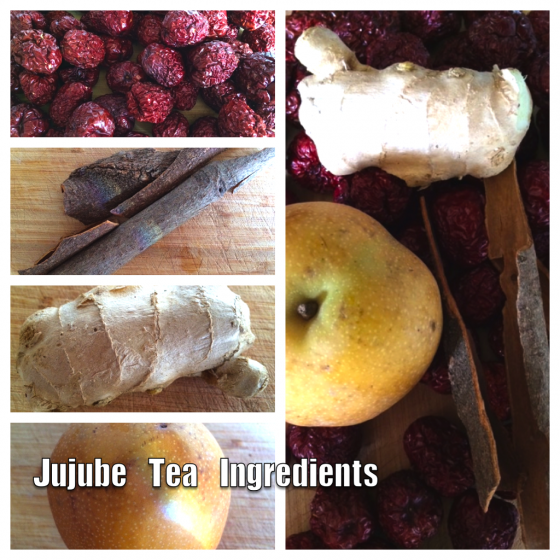What’s a Jujube? I’m not talking about those rubbery little candies we used to eat in the movies that could take a whole day to get out of your molars! These jujubes are small apple-like fruits that have been used in ancient medicine for over 4,000 years. When dried, they are also known as Asian dates, Chinese dates or Indian dates.
As Dr. Oz explains in his show about Ancient Chinese Cures, “Jujube, the red Chinese date, has been used for thousands of years in China to reduce stress and promote sleep, among many other wonderful health benefits. A big plus of the jujube is that it doesn’t make you tired when you take it during the day – actually, it seems to reduce fatigue related to nervousness. It is usually served as tea, made from a powder extract.” Well, here I was, face to face with the jujube fruit, dried and interesting-looking.
As I wandered through my local farmer’s market, I was first attracted by this colorful sign, praising the jujube for a myriad of benefits! If your farmer’s market doesn’t have the, you can get them on Amazon delivered right to your door!
 The jujube fruit, seed, bark and leaves are described in Korean, Indian, Japanese and Chinese traditional writings for its beneficial properties. The sweet, aromatic smell of the fruit is said to make teenagers fall in love! This adorable sign definitely piqued my interest and almost made me immediately fall in love with jujubes—as I got closer, I saw free samples of jujube tea being offered by a very enthusiastic lady touting all the health benefits. As you probably know by now, I love the saying, “Let Food be Thy Medicine,” and if jujubes deliver on all of these claims, it would be some sort of divine miracle! But I was intrigued so I tasted the tea and I really liked the flavor–mildly fruity with a little spice of ginger and cinnamon. Delicious!
The jujube fruit, seed, bark and leaves are described in Korean, Indian, Japanese and Chinese traditional writings for its beneficial properties. The sweet, aromatic smell of the fruit is said to make teenagers fall in love! This adorable sign definitely piqued my interest and almost made me immediately fall in love with jujubes—as I got closer, I saw free samples of jujube tea being offered by a very enthusiastic lady touting all the health benefits. As you probably know by now, I love the saying, “Let Food be Thy Medicine,” and if jujubes deliver on all of these claims, it would be some sort of divine miracle! But I was intrigued so I tasted the tea and I really liked the flavor–mildly fruity with a little spice of ginger and cinnamon. Delicious!
If you don’t live near a farmers market or yours doesn’t sell jujubes, check out this bag of dried, organic jujubes sold on Amazon!
According to Science Direct, the major mineral constituents in the the jujube are: potassium, phosphorus, calcium and manganese. Iron, sodium, zinc, copper, vitamin C, thiamine and riboflavin are also found in the fruit. In fact, jujubes contain 20 times the amount of vitamin C as citrus fruits. As described by “Health Benefits of Jujube Fruit” in EHow.com, the jujube fruit contains 18 of the 24 amino acids required by the human body. Jujubes contain saponins, which have a relaxing and soothing effect on the nervous system.
Jujubes have been eaten for 1,000’s of years for these health benefits:
- soothe the stomach
- ease sore throats and colds
- helps ease achy muscles
- suppress the appetite
- support cardiovascular health
- enhance metabolism
- cleanse the blood vessels
- eliminate oxidative stress in the liver
- inhibit growth of cancer tumor cells and has an anti-carcinogenic effect
- improve constipation as a mild laxative
- detoxify the liver and kidneys
- create a sense of well-being when feeling restless or irritable
- reduce anxiety
- alleviate insomnia and help promote a more restful sleep
- increase energy and stamina
- help build stronger muscles
- aid in digestion
- improve skin color and tone
- increases the activation of choline acetyltransferase and improves cognitive impairment disorder such as Alzheimer’s
19 Tea Brews to Cure Whatever’s Ailing You ….Get your Go-To-Go-Tea Guide
With a list like that and a lovely flavor, I inched a little closer to the table. The little, dried, dark reddish fruit looked a bit like olives or prunes and were heaped in a mountain for the picking. But also available were hand-bagged kits containing every you need to make Jujube Tea! Way too simple, convenient and interesting to pass up.
How to make Jujube Tea…..
Jujube Tea Ingredients Conveniently contained in the bag:
- about 1 pound of dried jujube fruits
- a stick of fresh ginger root, unpeeled
- several pieces of cinnamon bark
- 1 large Asian pear, unpeeled, uncored, sliced into quarters
Instructions
If you don’t live near a farmers market or yours doesn’t sell jujubes, check out this bag of dried, organic jujubes sold on Amazon!
- Place 1 gallon of water in large pot
- Slice ginger root into 1 inch pieces. Put into pot, unpeeled.
- Add the cinnamon bark and slices of Asian pear
- Make a deep cut into each jujube and put into the pot.
- Simmer for 4 hours
- Strain all solid ingredients out of the liquid and the rest is tea
- Drink and enjoy!
- I enjoyed it hot, immediately. But the remainder should be cooled and refrigerated. It should keep about 10 days. From the fridge, it can be warmed up or drank cold, as iced tea! I added a nice squirt of lemon and loved it cold.
- Jujube tea can also be made solely by simmering only dried jujubes for 4 hours. The additional ingredients give it a mellow cinnamon-ginger flavor and the Asian pear gives it added sweetness. There are also added health benefits from the cinnamon and ginger
- Your kitchen will smell amazing
If you don’t live near a farmers market or yours doesn’t sell jujubes, check out this bag of dried, organic jujubes sold on Amazon!
Click here for Dr. Oz and Ancient Chinese Cures to Relieve Stress
Click here to read more about Benefits of Dried Jujube
Westlake Village Farmers’ Market, California on Sundays
Click here for Science Direct article about the health benefits and nutrients found in jujubes
Click here for the EHow.com article on the health benefits of jujubes
Click here for the Ehow.com article on the health benefits of Jujube Tea
Click here for more information about Jujubes on Drugs.com
Vegan American Princess’ Handy Guide to Healthy Tea
Vegan American Princess’ How to Make Ginger Tea and the Health Benefits of Ginger Tea
Vegan American Princess’ How to Make Calming Soothing Turmeric Tea Like Dr. Sanjay Gupta
PS I have been drinking cup of Jujube Tea every night this week, sometimes hot, sometimes cold, always with a splash of fresh lemon juice and I’ve been sleeping like a baby (and by that I do not mean waking up every hour crying with a wet diaper!)
xox Enjoy!















I am definitely going to make this tea, sounds delicious and healthful! And I hope I don’t wake up crying every hour with a wet diaper either!
LOL Helen! Have you ever heard of jujubes? I never did before Ellen posted this. Looks good though, doesn’t it?
HI this is mike you know how much phsphours jujubie has per gram and also has good amount on protein how much per gram .If have chronic kidney condition must becareful
My neighbor Suk brought this Tea she made from above ingredients over about a year ago
In case you can’t find jujubes at the farmers market, I’ve ordered these and they’re the same, delivered to your door! https://www.amazon.com/PowerNutri-Shop-ORGANICLLY-guarantee-UNBEATABLE/dp/B01EM0NSIO/ref=sr_1_4_a_it?ie=UTF8&qid=1537807082&sr=8-4&keywords=jujubes&th=1
In case you can’t find jujubes at the farmers market, I’ve ordered these and they’re the same, delivered to your door! https://www.amazon.com/PowerNutri-Shop-ORGANICLLY-guarantee-UNBEATABLE/dp/B01EM0NSIO/ref=sr_1_4_a_it?ie=UTF8&qid=1537807082&sr=8-4&keywords=jujubes&th=1
My Kaiser Office had a farmers market this afternoon and I bought this bag of dried jujube fruit. The sweet Asian lady pointed at the sign that also mentioned the long list of its benefits. She said it was for tea or a quick snack. So I brought it home turned the flame on the pot of water, sat down and googled it. I found this blog, and find it interesting that unbeknownst to me I had brought home a second ingredient for this tea recipe; Asian pears. Now I’m excited to begin the 4 hour simmer tomorrow morning. Thanks for the tip! 🙂
In case you can’t find jujubes at the farmers market, I’ve ordered these and they’re the same, delivered to your door! https://www.amazon.com/PowerNutri-Shop-ORGANICLLY-guarantee-UNBEATABLE/dp/B01EM0NSIO/ref=sr_1_4_a_it?ie=UTF8&qid=1537807082&sr=8-4&keywords=jujubes&th=1
Hi, I have a beautiful jujube tree full of fruit in my garden in the north of italy.
Now I know what to do with it!
Thank you.
Claudia
Dear Claudia,
I would love to know if you can dry these fruits and make jujube tea with them! Thanks for reading and commenting!
Best, Ellen
You’re so lucky! Are you trying jujube tea?
Please Help-Veteran whom has many health issues in need of others help trying to find-get these JuJube. My lovely neighbor had made me Tea from this a few times. Looking to help us make our own. Respectfully susan
In case you can’t find jujubes at the farmers market, I’ve ordered these and they’re the same, delivered to your door! https://www.amazon.com/PowerNutri-Shop-ORGANICLLY-guarantee-UNBEATABLE/dp/B01EM0NSIO/ref=sr_1_4_a_it?ie=UTF8&qid=1537807082&sr=8-4&keywords=jujubes&th=1
I have several of the beautiful trees in my yard, they send out new trees in a root network. Trees are over 50 years old. Since childhood we have eaten the fruits and I am interested to know what is the best time to harvest and dry the fruits. I am wondering if using a dehydrator to dry would help. They have golden leaves in autumn before they fall from the trees.
Dear Jeri,
You are so fortunate to have these trees in your yard! Here is some info from a site called Papaya Tree Nursery for you. They seem to know exactly what you should do enjoy your jujube so!
“The jujube fruit will have developed full flavor and peak sugars when they are completely dark brown. You can however consume them when they are only approximately 50% brown and green everywhere else. The fruit should feel firm to the touch when consumed fresh and will begin to lose moisture soon after the skin of the fruit has turned completely brown while still on the tree.
The fresh fruit is best stored between 52* and 55* F in a special green plastic bag that counters the ethylene gas naturally given off by ripe fruit. You may have seen the info commercials promoting this product and just so you know, it does indeed work…( can you believe it?…no bullshit info commercials). They can also be allowed to fully dry on the tree or you may pick them when they just begin to show signs of desiccation ( wrinkled skin) and dry them in a flat open basket at room temperature out of direct sunlight. You should not pull the fruit off the tree, instead you should cut the small stem as this will give you a clean sealed product.
Sometimes the fruit will show signs of premature drying before fully brown or even at the light green stage and this fruit is usually not the best for drying as the fruit should be allowed to fully color up brown if the intention is to store dry fruit. The usual cause of this premature drying is from heat/water stress and should be less of an issue as the tree becomes more established since it is a drought tolerant species.
After the fruit has been satisfactorily dried, it is a good idea to freeze the fruit for a few hours, then remove from the freezer and allow the excess condensation to evaporate before placing the fruit in the storage container (Available at Smart&Final). Once the jujube has become established (Judgment call), I only fertilize the tree once a year just after the majority of the blossoms have set fruit.”
Good luck and please let us know how it comes out! Thanks for reading and commenting!
Salam,
In my mauntanious and desert area of karak kpk Pakistan jujube is cultivated for feeding to goats and sheep and jujbe fruite seldom eaten . but we know the dried jujube benefits like in common cold ( jushanda) and constipation especially but people preffere aleopathic medicine instead of herbals.
Thank you very much for the article about jujube benefit. I have tried it for lowering high blood pressure, my bp counting was 180/150 in three days it lower to 130/110.
Jujube fruits is very delicious in fresh and tremendous in dry phase.
Little children eat the seed in winters and summer raw when they break the outer shell of jujube which hard enough. People of my area love this tree as I mentioned above for feeding goats.
People sell jujube fresh fruits and exported to different central Asian countries. People says this one of the third fruit of heaven and this is the apple of poor people.
Thanks a lot.
I recently purchased a package of dried jujubes, and the back of the package says I should boil them in water for 30 minutes before serving…. is this a necessary step, or only a suggestion for making jujube tea? Meaning, can I eat the dried fruit like a snack, right out of the package?
You can try but sometimes they are very tough and chewy.
The dried jujubes are very hard to chew so I don’t recommend it. But perhaps if you softened them up in some water first, you could eat them straight! In case you can’t find jujubes at the farmers market, I’ve ordered these and they’re the same, delivered to your door! https://www.amazon.com/PowerNutri-Shop-ORGANICLLY-guarantee-UNBEATABLE/dp/B01EM0NSIO/ref=sr_1_4_a_it?ie=UTF8&qid=1537807082&sr=8-4&keywords=jujubes&th=1
I live in Orange County and buy my jujube tea kit from this same lady you have pictured every time I go to the Orange Farmer’s market. She’s also got me eating purple sweet potatoes. So much better than taking vitamins!!!! I was just super surprised to see her pictured on our page when all that I was doing was looking for the recipe to share with someone else.
Yes, she seems to be well-known for her jujubes! I’ve also been eating purple sweet potatoes!
The purple sweet potatoes are called ube in the Philippines. Makes for very colourful meals – icecream to sweets (candy) or boiled as you would potatoes.
This lady really gets around! Hope you’re still enjoying your jujube tea! In case you can’t find jujubes at the farmers market, I’ve ordered these and they’re the same, delivered to your door! https://www.amazon.com/PowerNutri-Shop-ORGANICLLY-guarantee-UNBEATABLE/dp/B01EM0NSIO/ref=sr_1_4_a_it?ie=UTF8&qid=1537807082&sr=8-4&keywords=jujubes&th=1
can the jujubes be reused after I make the tea? Can I re-dry them or once they are used, i discard them. Thanks,
I think discarding the jujubes is best but if you can create another use for them, let us know!
After the jujubes are cooked, they look pretty exhausted, haha! So I’m not sure if they can be reused.In case you can’t find jujubes at the farmers market, I’ve ordered these and they’re the same, delivered to your door! https://www.amazon.com/PowerNutri-Shop-ORGANICLLY-guarantee-UNBEATABLE/dp/B01EM0NSIO/ref=sr_1_4_a_it?ie=UTF8&qid=1537807082&sr=8-4&keywords=jujubes&th=1
Hi Ellen!
I just discovered the Jujube seller at our local farmers market in Westlake Village – the same one in your article here, and started drinking the tea this weekend. As I was googling Jujube tea, I was so happy to come across your blog and what you wrote about it. Are you still drinking it? I would love to know what results you continue to have.
Thanks!!!
Best,
Tracie
I’ll bet Ellen is still drinking Jujube Tea. If she blogged about it, she really likes it!
Debby xoxo
I love jujube tea and still make it. The kitchen smells so good when it’s cooking! Are you still making it?
I still love jujube tea! I find it very soothing and delicious! In case you can’t find jujubes at the farmers market, I’ve ordered these and they’re the same, delivered to your door! https://www.amazon.com/PowerNutri-Shop-ORGANICLLY-guarantee-UNBEATABLE/dp/B01EM0NSIO/ref=sr_1_4_a_it?ie=UTF8&qid=1537807082&sr=8-4&keywords=jujubes&th=1
Ellen,
I’m drinking the tea right now. I met that energetic Asian woman at the Oxnard farmers market and went home to make my tea. My daughter and I have been enjoying it this week, how and cold. Amazing!
Excellent! Glad to hear it!
In case you can’t find jujubes at the farmers market, I’ve ordered these and they’re the same, delivered to your door! https://www.amazon.com/PowerNutri-Shop-ORGANICLLY-guarantee-UNBEATABLE/dp/B01EM0NSIO/ref=sr_1_4_a_it?ie=UTF8&qid=1537807082&sr=8-4&keywords=jujubes&th=1
I, too, just bought the bag of ingredients from the same lady. (FYI – she has the best pomegranates when they’re in season, she sells the whole pomegranates and also the arils in a plastic container – for those who don’t want the hassle of seeding a pomegranate).
I’ve made longan tea in the past – using jujubes and longans (which I got from the 99 Ranch Market) along with ginger. It’s great for colds.
Thanks for printing the recipe and for continuing to drink the tea.
In case you can’t get jujubes from the farmers market, try these out on Amazon! They’re very comparable! https://www.amazon.com/PowerNutri-Shop-ORGANICLLY-guarantee-UNBEATABLE/dp/B01EM0NSIO/ref=sr_1_4_a_it?ie=UTF8&qid=1537807082&sr=8-4&keywords=jujubes&th=1
I am so happy I found this thread. I drank Jejube tea when I was in South Korea and fell in love with it. Now that I am back in the Midwest I am wondering if anyone has purchased any of the”packaged” tea from Amazon or online that would recommend a brand?
Thanks for your input .
Have an awesome day!
I would recommend this link for jujubes on Amazon. I’ve ordered them before and they are just like what I can get at the farmer’s market. https://www.amazon.com/PowerNutri-Shop-ORGANICLLY-guarantee-UNBEATABLE/dp/B01EM0NSIO/ref=sr_1_4_a_it?ie=UTF8&qid=1537807082&sr=8-4&keywords=jujubes&th=1
Thank you Ellen! I love jujubes 🙂 Can jujubs be reused after making tea?
After making the tea, the jujubes are pretty well spent. I don’t know what they can be used for, but maybe a smoothie?
This is also a great reference on jujubes: https://www.amazon.com/Ancient-Yet-Modern-Popular-Depth/dp/1542309891
Thanks James! We appreciate your input and the additional information!
Thank you for sharing this healthy recipe! I live the eco-friendly lifestyle and love natural food. Can’t wait to try this tea